Search Results
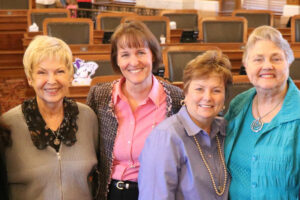
Steel Magnolias – Conversation with former Representatives Martha Jenkins, Ginger Barr, Nancy Brown, October 18, 2019
Interviewed by Joan Wagnon
This conversation among four female legislators describes their experiences as friends and colleagues in the Kansas Legislature in the 1980's and early 1990's. The climate of the Legislature at that time encouraged women to make friendships across the aisle without worrying about political party. Republican women had formed a group called the Steel Magnolias, saying "we're all different but we come together when we need to get something done." The particular incident described in this short conversation was an attempt to defeat a budget proposal in retaliation for an abortion amendment. News coverage of the incident stated, Show More"GOP Women's gang of Eleven shows men their chauvinism can be costly." The conversation concludes with memories of their legislative service and favorite issues.
Highlight -- a short excerpt from the interview
Show Less
The Legislative Wives – Conversation with Sue Bond, wife of former Senator Dick Bond, September 6, 2019
Interviewed by Joan Wagnon
This short conversation with Sue Bond describes her experiences with other wives of Kansas legislators and wives of Kansas Governors. The Legislative Wives Association was formally organized in 1933 as a social medium for the wives of Kansas state legislators during sessions. The group held luncheons every week, rotating who acted as hostesses. Informally organized in 1929, the group originally met at the Topeka YWCA and later met at hotels in the city, mostly the Jayhawk Hotel. In this conversation Bond describes the Wives group as important for social support, information sharing, and fund-raising for Cedar Crest with Show Morethe sale of their Capitol Cookbook. Show Less

Interview of Bill Bunten, February 18, 2015
Interviewed by Burdett Loomis
Bill Bunten's 28 years in the House, 20 of them on the Ways and Means or Appropriations committee, gave him tremendous knowledge about the state budget. He chaired Appropriations from 1983 until 1990 when he left the legislature. He returned to the state Senate in 2003 to fill an unexpired term. Bunten later served two terms as Mayor of Topeka from 2005 until 2013.

Interview of Doug Mays, September 25, 2020
Interviewed by Alan Conroy
This interview with former Speaker Doug Mays contains good insight into how the Kansas House of Representatives functioned at the end of the Twentieth Century and the first decade of the Twenty-First. The institution was changing as its membership became more conservative. Mays describes in great detail how its leadership dealt with controversial issues such as school finance and taxation. Mays cites two issues as his proudest accomplishments: passing a sales tax to lower property taxes for Washburn University and neighborhood revitalization legislation. Speaker Mays notes that every time a bill came through, he read Show Moreit. His discussion of the power of the speaker is illustrated with numerous examples. “ I believed in the process. I believed that the speaker was the keeper, the protector of the process.” He promoted civility in the body and developed a good relationship with the Minority Leader Dennis McKinney which allowed him to end the 2005 Special Session without adjourning sine die. Mays promoted greater use of technology for the legislature and tightening of deadlines to ensure smooth operations. There are several examples of his relationship with governors. Anyone interested in being a speaker should read this interview. Show Less
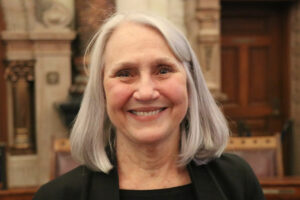
Interview of Nancy Parrish, October 23, 2020
Interviewed by Patty Clark
This 2020 oral history interview of former State Senator Nancy Parrish is packed full of information about people and policy between 1980 and 1992 in the Kansas Senate. She was one of the first, if not the first Democrat women elected to the state senate. Parrish talks about establishing her own identity after filling the unexpired part of her husband's term and winning the seat three more times while fostering a child, adopting a child, and attending law school at Washburn University. Her relationships with Republican senators allowed her to be effective in passing or shaping legislation. Show MoreParrish served on the conference committee to negotiate the 1992 school finance bill. Parrish also discussed her two years as Secretary of Revenue and working with Senator Gus Bogina to pass legislation to provide for purchase of a large-scale computer system for collecting taxes at the Department of Revenue. Parrish offers opinions on the importance of the separation of powers in the constitution, from her perspective as a former legislator, an executive branch administrator and a judge. For Parrish, each of these experiences has been a learning experience. She concludes the interview by expressing concern about the loss of "camaraderie" among legislators. Show Less

Interview of Marge Petty, September 11, 2020
Interviewed by Patty Clark
This oral history interview of former Senator Marge Petty covers her 12 sessions in the State Senate representing a Topeka district (Senate 18). Petty talks about why she registered as a Democrat, challenged a sitting Republican woman Senator in the 1988 election, and won. She discusses specific issues such as the investigation of the KPERS venture capital investments with other Senators, healthcare issues, foster care, and education. The interview also chronicles her career after leaving the legislature in 2000. Petty talks candidly about losing that last election, after which she began working for the Kansas Corporation Show MoreCommission. Later, she decided to move back to Dallas and worked to secure an appointment from President Obama as a regional representative of Health and Human Services. Petty describes the process of going after that appointment. This is a wide-ranging interview that shows the energy and skills Petty brought to the public arena. Show Less
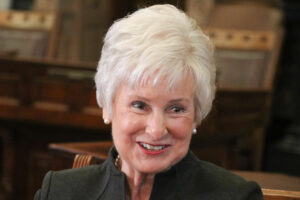
Interview of Alicia Salisbury, October 23, 2020
Interviewed by Patty Clark
Former Senator Alicia Salisbury grew up in a political family--both father and grandfather served in the legislature--so her sixteen years of service as a Kansas Senator continued the family tradition. She also was a serious legislator who believed in community service as witnessed by the numerous boards and committees on which she served, both volunteer and elected. Salisbury's driving interests were improving the economy of Kansas and bringing growth in wealth to her community and state. Salisbury's 2020 oral history interview chronicles her work ethic. With her children no longer at home, she had the Show Moretime and the interest to dive into a wide assortment of issues, from workforce development, to interstate banking, to telecommunication reform, to a blue ribbon panel on workers compensation. Salisbury worked long hours and focused on constituent services. She boldly asked for the committees that interested her and championed changes where necessary. Salisbury succeeded in changing the Labor and Industry Committee into the Commerce Committee to handle everything from economic development strategies to workers compensation. She tackled tough issues with a sense of humor and the skills of collaboration learned as a volunteer leader. This interview describes her determination, her commitment, and her legacy to the state of Kansas as Vice President of the Senate. Show Less

Triple Date – Conversation with former Senators Alicia Salisbury and Nancy Parrish, October 23, 2020
Interviewed by Joan Wagnon
In this short 2020 Statehouse Conversation two former Kansas State Senators, Nancy Parrish and Alicia Salisbury recall their first year serving in the Kansas Senate. In 1984 Shawnee County elected three women Senators: Nancy Parrish, a Democrat; Jeannie Hoferer, a Republican, and Alicia Salisbury, a Republican. Martin Hawver, a reporter for the Topeka Capitol Journal at that time, referred to them as a "Triple Date." Two of the three former senators discuss briefly what it was like in the Senate in 1985 when they took their seats and how they were treated by their male colleagues. Salisbury and Parrish saw Show Morewomen's issues as "people issues." Salisbury relates being removed from a conference committee on an education bill because she "did what's best for the schools she represented." Show Less
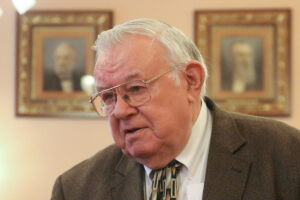
Interview of Ralph Skoog, July 17, 2015
Interviewed by Burdett Loomis
In his 2015 oral history interview, former Representative Ralph Skoog recalls a Kansas Legislature in transition. Ralph was initially elected to represent Topeka and Shawnee County in 1961, prior to the U.S. Supreme Court's Baker v. Carr 'one-person, one-vote' decision. His first 'district' was one-third of Shawnee County. When he returned to the House in 1967 after an unsuccessful campaign for Congress in 1964, he represented a more equal-size district of approximately 17, 000 residents of the County. Ralph recalls a legislature very much in transition at the beginning of the decline of rural domination of Show Morethe policymaking process and at the beginning of institutional change that came to fruition after the end of his last term. He recalls passage of important highway, prison, and school district consolidation legislation during his time of service in the House. Show Less
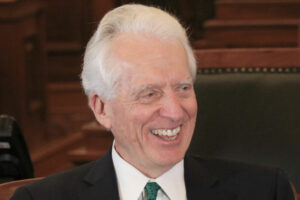
Interview of James (Jim) Slattery, March 6, 2020
Interviewed by Jim McLean
The 1970's marked major changes in state government. They are doing away with county welfare offices and creating the Department of Social and Rehabilitation Services (SRS) Concerns over lack of equalization started with Caldwell school finance case. Transportation is being centralized and modernized with the creation of the Department of Transportation (KDOT). Slattery even introduced legislation to decriminalize small amount of marijuana. Campaign finance reform (post-Watergate) and hiring non-partisan, professional staff for the legislature took hold. Slattery and another new freshman, Mike Hayden support legislation to clean up strip mines and reclaim mined Show Morelands. The first income tax reform was initiated despite the governor's veto. Community corrections is emerging as a good strategy. Slattery describes the role of abortion in civil discourse in this interview, how it started in the Dole/Roy race in 1974, and how it continues to distort the American political system in a significant way. He explains why he ran for Congress as a deficit hawk and talked about some of his Congressional experiences. The interview closes with a story about Tip O'Neil and another about former Speaker Clyde Hill who advised Slattery to be accurate when speaking at the Well of the House. Show Less
